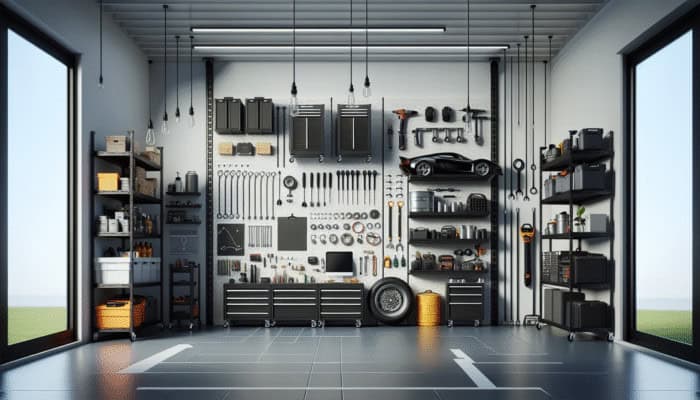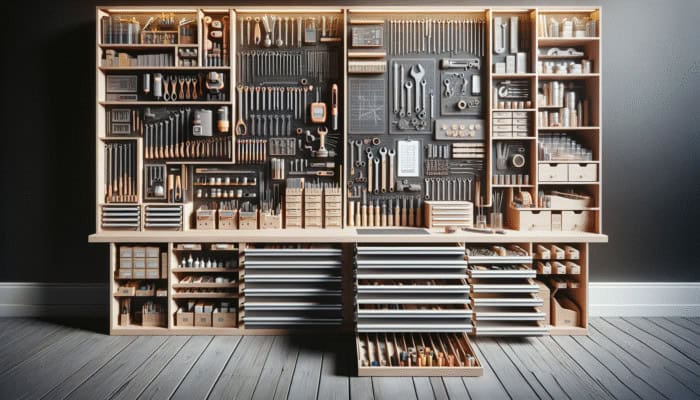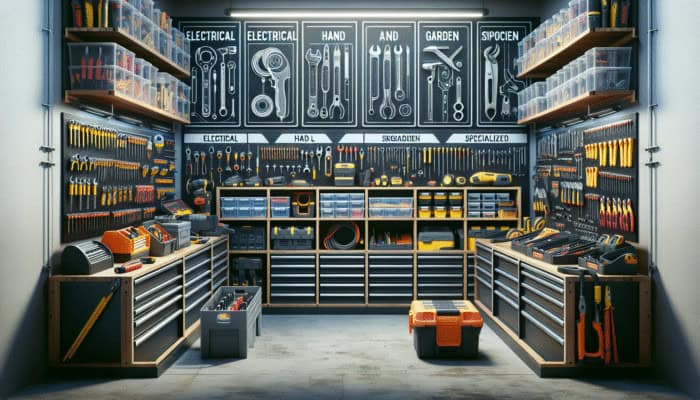Optimising Storage Space in Compact Areas
Maximise Your Vertical Storage Potential

Finding sufficient space for tools can often be daunting, particularly in residences with limited storage options. One of the most impactful tools for organising home decluttering strategies is effectively using vertical space. Frequently overlooked, walls and ceilings can be transformed into excellent storage solutions. By installing wall-mounted racks or pegboards, you can hang tools that are easily accessible, thus freeing up valuable floor space. This method not only improves accessibility but also keeps tools visible, which significantly reduces the frustration associated with searching for misplaced items.
Explore the variety of wall hooks and brackets available at your local hardware store. These can be strategically positioned in garages, sheds, or even utility rooms. For those who favour a more visually appealing option, decorative wall-mounted shelves can serve dual functions as attractive decor and practical storage solutions. Additionally, ceiling-mounted storage for larger items such as ladders or extension cords can greatly declutter your living area, creating a more spacious environment.
Embracing this vertical storage approach can be transformative, particularly for individuals residing in compact flats or townhouses. By fully utilising available height, you can cultivate a more organised environment that enhances aesthetic appeal and promotes efficiency during house clearance tasks, making the entire process more streamlined and manageable.
Efficient Compact Storage Solutions
When space is limited, implementing compact storage solutions becomes essential in your tool organisation strategies for home decluttering. One effective approach is to opt for stackable containers, which can be easily stored in cupboards or on shelves. This allows for an orderly arrangement of tools without consuming excessive room. This method ensures that your tools are neatly organised and readily accessible, enhancing your ability to find what you need when needed.
Another brilliant option is modular storage units. These systems can be customised to fit your specific requirements, allowing you to expand or reduce your storage capacity. For instance, modular shelving systems can be adjusted to accommodate different sizes and types of tools, ensuring that everything has a designated place. This flexibility is particularly advantageous for households with changing tool collections, whether due to new projects or seasonal shifts.
In addition to traditional storage options, consider investing in multi-functional furniture. Pieces like ottomans with concealed compartments or coffee tables featuring built-in drawers can provide extra storage space without sacrificing style. This approach is especially beneficial for those who maintain a tidy living area while ensuring their tools are systematically organised and easily accessible.
Incorporating Multi-functional Furniture into Your Space
Integrating multi-functional furniture offers both practicality and aesthetic appeal in the search for tool organisation strategies for home decluttering. Selecting furniture that serves dual purposes can significantly reduce clutter in your living space. For instance, a stylish bench at the entryway can provide seating while cleverly hiding tools within its storage compartment. This method maximises utility and enhances your home’s overall aesthetic charm.
Consider sofas that feature hidden storage beneath the cushions or beds equipped with drawers suitable for housing tools and supplies. These inventive designs let you organise your tools without compromising living space. When hosting guests or family gatherings, the tools remain neatly tucked away, ensuring that your home upholds a welcoming atmosphere.
Furthermore, investing in folding tables can provide additional work surfaces when needed and can be easily stored away when unused. This is particularly advantageous for DIY enthusiasts who may temporarily require extra workspace. Integrating multi-functional furniture into your home fosters an environment that supports both productivity and relaxation, making house clearance tasks much more manageable.
Effective Strategies for Sorting and Organising Your Tools

Implementing Comprehensive Labelling Systems
A well-structured tool storage system in your home relies heavily on effective labelling. Establishing a clear and visible labelling system ranks among the most impactful tools for organisation strategies for home decluttering. Labels serve as visual cues, enabling you to locate the necessary tools without unnecessary searching. Invest in high-quality labels that can withstand various conditions, ensuring their longevity and readability for years.
Consider employing colour-coded labels to introduce an extra layer of organisation. For example, you might designate green labels for gardening tools, blue for electrical tools, and red for hand tools. This method enhances visibility and facilitates quick identification, saving precious time during projects or clean-ups. Additionally, you can utilise label makers to create professional-looking labels tailored to your specific storage solutions.
Another effective tactic is positioning labels at eye level to ensure their visibility. This is particularly important in garages or sheds with high storage. By dedicating a little time to creating a comprehensive labelling system, you streamline the process of finding and organising your tools, ultimately enhancing efficiency and reducing the stress associated with house clearance.
Organising Tools by Usage Frequency
Organising your tools according to their frequency of use is crucial in your tool organisation strategies for home decluttering. By placing the most frequently used tools within easy reach, you enhance accessibility and significantly reduce the time spent searching for necessary items. Consider creating a “daily tools” zone where essential items like hammers, screwdrivers, and pliers are kept in a designated space that’s readily accessible.
A separate storage area can be established for tools that are used less frequently, such as specialised equipment for specific projects. This could involve storing these tools in a less accessible part of your garage or shed, allowing the primary storage area to remain clear and functional. This system promotes efficiency and reduces the risk of accidents, as seldom-used tools can be stored out of the way.
Moreover, implementing a seasonal rotation of tools can be particularly beneficial. For instance, during winter, ensure snow shovels and ice scrapers are easily accessible, while gardening tools can be stored away until spring. This dynamic approach to organisation allows you to adapt your storage solutions according to changing needs, making house clearance more manageable and effective throughout the year.
Organising Tools by Type for Maximum Efficiency

Categorising tools by type is paramount for a truly effective tool organisation strategy for home decluttering. This technique lets you quickly locate what you need without sifting through an unorganised collection. Begin by grouping tools into electrical, hand, garden, and specialised tools. Each category can then be assigned its storage area, such as a dedicated shelf or tool chest.
Incorporating clear bins or drawer dividers can further enhance this organisational system. Labelling each section helps maintain order over time. This method is particularly useful when working on large projects requiring various tools. Knowing exactly where each tool is located lets you concentrate on the task rather than wasting time searching for the right equipment.
Additionally, consider using toolboxes for portable toolkits that can be easily transported from one task to another. This is especially beneficial for DIY projects that may take place in different areas of your home or garden. By maintaining a clear separation of tools by type, you streamline your workflow and foster a harmonious working environment that enhances productivity.
Utilising Colour-Coding for Quick Identification
Implementing a colour-coding tool organisation strategy for home decluttering can significantly streamline your tool storage system. By assigning specific colours to different categories of tools, you enhance visibility and nurture a more organised environment. For instance, you might designate blue for power tools, green for gardening equipment, and red for hand tools.
This method is exceptionally effective in both small and expansive storage areas. When tools are stored in clear bins or on open shelves, the colour-coded system allows for quick identification at a glance. This can be particularly advantageous during busy projects or when multiple people use the same space, as it reduces confusion and expedites retrieval.
Moreover, colour-coding can extend beyond the tools themselves to include storage areas. For example, using coloured tape to delineate the boundaries of each tool zone can help everyone in the household understand where items belong. This enhances the organisation and encourages a tidiness culture, making it easier to maintain order during house clearance and everyday usage.
Arranging Tools Based on Size
Arranging tools according to their size is another effective strategy in your tool organisation strategies for home decluttering. By placing larger tools at the bottom of storage units and smaller items at the top or in easily accessible drawers, you optimise space and ensure safety when retrieving items. This arrangement maximises storage efficiency and simplifies quickly locating the right tool.
Consider using tiered shelving systems that allow smaller items to sit above larger ones, ensuring everything remains visible. This method is particularly useful in limited spaces where traditional shelving may not provide enough room for various tool sizes. Furthermore, dedicated compartments for smaller tools can prevent them from getting lost among larger items, keeping your workspace tidy and well-organised.
In addition, think about how you can use clear containers to separate tools by size within a larger storage area. For example, using small bins for screws, nuts, and bolts allows you to maintain order while maximising the use of available space. By prioritising size in your arrangement, you create an accessible and efficient storage system that enhances your overall workflow during house clearance tasks.
Innovative Approaches to Tool Storage
Utilising Pegboards for Versatile Storage Solutions
Installing pegboards is one of the most innovative organisational strategies for home decluttering. These versatile surfaces offer a fantastic way to store tools while maintaining accessibility and visibility. Pegboards can be mounted in garages, workshops, or even utility rooms, providing a flexible storage solution that can be tailored to your specific needs and preferences.
Hooks and shelves on pegboards allow you to easily rearrange your tools based on ongoing projects or personal preferences. This adaptability ensures that your storage system can evolve as your tool collection grows. Moreover, storing tools on pegboards facilitates easy identification, eliminating the common issue of rummaging through drawers or boxes in search of the right items.
In terms of aesthetics, pegboards can be painted or styled to match your existing decor, ensuring they blend seamlessly into your home environment. As you organise tools on pegboards, consider grouping them by type or frequency of use, enhancing function and appearance. This innovative approach to tool storage not only maximises space but also promotes a more organised and visually appealing workspace.
Utilising Tool Chests and Cabinets for Effective Organisation
Employing tool chests and cabinets is a cornerstone of effective tool organisation strategies for home decluttering. These units are designed to keep tools sorted and protected, making them ideal for anyone seeking to maintain order in their workspace. A well-structured tool chest can provide various compartments and drawers, enabling you to categorise tools by type, size, or usage frequency.
Investing in a high-quality tool cabinet can significantly enhance the longevity of your tools, shielding them from dust, moisture, and potential damage. Additionally, cabinets can be locked, ensuring that hazardous tools are stored securely and out of reach of children or pets. This safety feature is particularly crucial for families, making tool organisation not just about accessibility but also about responsible management.
When selecting a tool chest or cabinet, consider the overall layout of your workspace. Choosing units that fit snugly within your available space while maximising storage capacity will contribute to a more efficient environment. Using these storage solutions to maintain a clean and organised area enhances productivity and ease during house clearance tasks.
Employing Magnetic Strips for Metal Tool Storage
Mounting magnetic strips is an ingenious method in your tool organisation strategies for home decluttering, especially for storing metal tools. These strips provide a secure and easily accessible solution for items such as screwdrivers, wrenches, and pliers. By attaching magnetic strips to your garage or workshop walls, you can keep these frequently used tools within easy reach while also saving valuable space.
The true beauty of magnetic strips lies in their versatility. They can be cut to size and arranged in various configurations to suit your preferences and available wall space. This adaptability ensures you can create a personalised storage solution that caters to your needs. Furthermore, using magnetic strips allows for quick identification and retrieval of tools, especially during busy projects.
In addition to convenience, magnetic strips can enhance your workspace’s overall aesthetic. With tools neatly arranged along a wall, you create a visually appealing display that showcases your equipment while promoting an organised environment. This solution maximises storage and inspires creativity and efficiency during house clearance and DIY tasks.
Strategies for Decluttering and Donating Tools
Evaluating the Necessity of Your Tools
Regularly assessing the necessity of your tools is a vital component of effective tool organisation strategies for home decluttering. Over time, it’s common to accumulate tools that may no longer serve a purpose or are duplicates of your items. Evaluating your collection allows you to identify which tools are essential for your current projects and lifestyle.
Begin by categorising tools into groups based on their frequency of use. For items that haven’t been touched in over a year, consider whether they must remain in your collection. This process can be quite liberating, as it removes unnecessary clutter and helps you focus on tools that genuinely support your activities.
Once you have identified no longer needed tools, you can decide whether to donate, sell, or recycle them. This benefits your space and contributes to the community by providing tools to others who may need them. Engaging in this process regularly ensures that your tool collection remains lean and functional, ultimately making house clearance more manageable in the long run.
Organising Community Donation Drives
Setting up donation drives can be a rewarding way to manage your tools while giving back to the community, making it an excellent tool organisation strategy for home decluttering. Many local organisations, such as community centres or charity shops, often welcome donations of tools, especially those in good condition. By organising a drive, you can facilitate collecting and distributing these tools to individuals who may benefit from them.
When planning a donation drive, consider collaborating with local organisations to maximise outreach. Promote your drive-through community boards or social media to encourage participation from neighbours and friends. This creates a sense of community engagement and can lead to a larger collection of shared tools.
Additionally, organising a donation drive provides an opportunity to educate others about the importance of responsible tool management and decluttering. Hosting an event where individuals can learn about sorting tools and donating can inspire others to follow suit, ultimately fostering a culture of sharing and sustainability within your community. By engaging in this practice, you declutter your space effectively and contribute positively to those around you.
Strategies for Selling Unused Tools
Selling unused tools is another effective tool organisation strategy for home decluttering. Many individuals have tools that are in good condition but simply no longer serve a purpose. You can declutter your space by selling these items while recouping some of your investment.
Online marketplaces such as eBay or Facebook Marketplace are excellent platforms for selling tools. Create clear listings with detailed descriptions and photographs to attract potential buyers. Additionally, consider hosting a garage sale, which can be a fun way to declutter while engaging with your community. This approach allows you to pass on your tools to those who need them and make some extra cash in the process.
When selling tools, be honest about their condition and value. Transparency builds trust with buyers and increases the likelihood of a successful sale. By turning unused tools into cash, you create a win-win situation: your space becomes more organised, and someone else benefits from your items.
Ensuring Safety and Accessibility in Tool Storage
Secure Storage for Hazardous Tools
Safety should be a top priority in your tool organisation strategies for home decluttering, particularly regarding hazardous tools. Items such as saws, blades, and chemical-based products must be stored securely to prevent accidents, especially in homes with children or pets. Designate a specific area within your garage or shed for these tools, ensuring they are kept out of reach and marked for safety.
Investing in lockable storage units can enhance security, providing peace of mind that dangerous tools are safely stored away. Additionally, consider using clear containers or colour-coded labels to indicate hazardous items. This reinforces safety and promotes awareness among all household members regarding the potential risks of specific tools.
It is essential to regularly review and update your storage system to reflect any changes in your tool collection. Maintaining a proactive approach to safety ensures that your workspace remains organised and secure, allowing you to focus on your projects confidently.
Ensuring Easy Access to Frequently Used Tools
To enhance efficiency during house clearance, placing frequently used tools in easily accessible locations is key. This approach allows for quick retrieval, reducing the time spent searching for essential items when tackling projects. Consider creating a dedicated zone for these tools, such as a shelf or drawer reserved solely for daily-use items.
Organising tools by their frequency of use improves accessibility and contributes to a more streamlined workflow. By keeping essential tools at the forefront, you minimise disruption during projects and create an environment that fosters productivity. This system can particularly benefit households with multiple users, allowing everyone to find what they need easily.
Incorporating visual cues, such as labels or colour coding, can further enhance accessibility. By making it obvious where tools belong, you encourage all household members to return items to their designated spots, ensuring that organisation is maintained over time. By prioritising easy access, you simplify the entire house clearance process, making it more efficient and less stressful.
Designing Ergonomic Storage Solutions
When designing your tool storage solutions, consider ergonomics for both safety and ease of use. Ergonomic storage reduces strain and potential injuries when retrieving and using tools, making it an important aspect of tool organisation strategies for home decluttering. Designing storage areas that allow for easy access without excessive bending, reaching, or stretching can greatly enhance your comfort and efficiency.
For instance, storing heavier tools at waist height rather than on the floor or high shelves can help prevent back strain. Similarly, using pull-out drawers or sliding shelves allows you to access tools without excessive twisting or bending. This thoughtful design consideration improves safety and the overall experience of working with your tools.
Additionally, consider investing in tool storage solutions that feature cushioned grips or easy-open mechanisms to enhance comfort during use further. By prioritising ergonomic design in your storage solutions, you create a workspace that promotes safety and efficiency, making house clearance more manageable.
Implementing Clear Signage and Labelling
Clear signage and labelling are fundamental to maintaining safety and accessibility in your tool storage system. Properly labelled storage areas ensure that everyone in your household knows where to find tools and how to handle them safely. This practice fosters an organised environment and promotes responsible behaviour regarding tool usage.
Consider using large, bold labels that are easily read from a distance. When combined with colour coding, this method enhances visibility and makes it easy for household members to identify the right tools quickly. Additionally, using symbols or images alongside text can further assist those struggling with reading labels, reinforcing understanding across all users.
Clear signage in your workspace can also remind you about safety practices, such as “use gloves” or “sharp tools—handle with care.” This approach reinforces the importance of safety while contributing to a culture of conscientiousness regarding tool storage and usage. Establishing clear signage and labelling creates a safer, more organised environment that streamlines the house clearance process.
Strategies for Sustaining an Organisation
Establishing Regular Cleaning and Tidying Routines
Establishing a routine for regularly cleaning and tidying tool storage areas is essential in your tool organisation strategies for home decluttering. Setting aside specific times—weekly or monthly—to clean and reorganise your tools ensures that clutter does not accumulate over time. This practice not only enhances the overall appearance of your workspace but also promotes efficiency and accessibility.
During your cleaning sessions, take the opportunity to reassess your tools and storage solutions. This is an ideal time to evaluate the necessity of each item, ensuring that your collection remains relevant to your current projects and needs. You might discover tools that can be donated or sold, further decluttering your space and making organisation more manageable.
Incorporating a cleaning routine is about fostering good habits. Encourage household members to contribute to this practice, making it a collective effort. By maintaining a tidy workspace, you create a more pleasant environment and enhance productivity during house clearance and DIY projects.
Updating Your Storage Systems Regularly
Periodically reviewing and updating your storage systems is crucial to ensure they continue to meet your evolving needs. Your organisation’s solutions may need to adapt as your tool collection grows or changes. This review process should be a regular part of your tool organisation strategy for home decluttering.
Consider evaluating your current storage solutions every six months. Are there tools that you no longer use or need? Are storage units still functional and efficient? By taking the time to assess these factors, you can make necessary adjustments that enhance accessibility and efficiency in your workspace.
It’s also important to stay informed about new storage solutions that better suit your needs. Innovations in tool storage are continually emerging, offering exciting options to optimise your organisation’s system. By remaining adaptable and open to change, you can maintain a workspace that evolves alongside your projects, making house clearance a less daunting task.
Training Household Members on the Organisation System
Educating all household members on the importance of maintaining the organisation system is vital in your tool organisation strategies for home decluttering. Everyone should understand how to use the organisational system effectively and its rationale. This collective ownership fosters responsibility and encourages everyone to contribute to maintaining order in the household.
Consider hosting a family meeting or workshop to review the organisational system. Demonstrate how to properly use and return tools to their designated places. Highlight the benefits of maintaining a tidy workspace, such as enhanced safety and efficiency during projects.
You create a shared sense of accountability by involving everyone in the process. Establishing clear expectations about tool usage and organisation encourages all household members to take pride in tidying the space. This commitment to organisation simplifies house clearance efforts and reinforces a culture of respect and responsibility within the household.
Cost-Effective Tools for Organising Your Space
Creating DIY Storage Solutions
Creating storage solutions can be one of the most cost-effective organisational strategies for home decluttering. With a bit of creativity and resourcefulness, you can construct storage units that perfectly fit your needs without straining your finances. For instance, using wooden pallets or old crates can be an excellent way to build shelving systems for your tools.
In addition to woodworking, consider utilising items you already have at home. Old drawers can be repurposed as storage bins, while plastic containers can be transformed into tool organisers with a few modifications. This approach not only saves money but also allows you to customise your storage solutions according to your unique requirements and preferences.
Furthermore, DIY projects can be enjoyable and fulfilling. Engaging in this creative process can provide a sense of accomplishment, especially when the results improve your organisation’s system. By embracing DIY storage solutions, you contribute to a more organised home while maintaining a budget-friendly approach to house clearance.
Repurposing Household Items for Creative Storage
Repurposing household items as storage solutions is a clever way to enhance your tool organisation strategies for home decluttering while reducing waste. Consider the various containers, bins, and furniture pieces you may own. For example, an old shoe organiser can be transformed into a perfect storage solution for gardening tools, while mason jars can hold screws and nails in an easily accessible manner.
This creative approach saves money and promotes sustainability within your home. By reimagining items that might otherwise end up in the bin, you contribute to reducing waste while finding practical ways to organise your tools efficiently.
Additionally, repurposing household items often adds character to your storage solutions. Unique or vintage containers can serve as intriguing focal points in your workspace, reflecting your personality while maintaining functionality. Embracing this practice simplifies house clearance and contributes to a more eco-friendly lifestyle.
Acquiring Second-Hand Storage Solutions
Purchasing second-hand storage units can be budget-friendly to enhance your tool organisation strategies for home decluttering. Many overlook the potential of second-hand items, but local thrift stores, online marketplaces, and garage sales often have a treasure trove of storage solutions waiting to be discovered. Look for sturdy shelving units, cabinets, and tool chests that still have plenty of life.
Buying second-hand saves you money and helps promote recycling and sustainability. Giving items a new lease of life contributes to a more environmentally conscious approach to home organisation. This practice aligns perfectly with the ethos of decluttering, as it reduces the demand for new products while helping you achieve a functional and organised workspace.
As you explore second-hand options, inspect items for quality and usability. Look for storage solutions that can be easily adapted to fit your needs, ensuring you maximise your investment. Combining budget-friendly options with innovative storage solutions allows you to transform your workspace while maintaining an eye on costs.
Your Frequently Asked Questions Answered
How can I effectively maximise small storage spaces for tools?
To optimise small storage areas for tools, use vertical space with wall-mounted racks, stackable containers, and multi-functional furniture. These strategies enhance accessibility and keep tools organised without sacrificing valuable space.
How do I create an effective labelling system for my tool storage?
Implement a clear labelling system using durable, visible labels that are easily read. Consider colour-coding categories for quick identification and eye-level position labels for enhanced visibility.
What is the best method to separate tools based on usage frequency?
Organise tools into zones based on their frequency of use, placing frequently accessed tools within easy reach and storing less commonly used items further away to streamline access during tasks.
How can I safely store hazardous tools in my home?
To maintain safety in the home environment, ensure hazardous tools are stored in lockable cabinets or on high shelves, clearly labelled, and out of reach of children and pets.
What are some creative DIY storage solutions for tools?
Craft your storage solutions using wooden pallets, old crates, or even repurposed furniture items. This cost-effective approach allows for a customised organisation tailored to your needs.
How often should I reassess the necessity of my tools?
Assess your tools regularly, every six months, to determine their necessity. This practice prevents clutter and ensures that your tool collection remains relevant to your current needs and projects.
Can I donate unused tools instead of discarding them?
Donating unused tools is an excellent way to declutter while giving back to the community. Local charities and community centres often welcome tool donations in good condition.
How can I train my family to maintain the tool organisation system?
Educate household members on the organisation system, including returning tools to their designated spots. Encouraging collective responsibility fosters a culture of organisation within the home.
What is the significance of ergonomic storage design?
Ergonomic storage design reduces strain and potential injuries during tool usage. Proper design enhances accessibility, making it safer and easier to retrieve items during projects.
How can I creatively repurpose household items for tool storage?
Repurpose items like old containers, drawers, or furniture to create unique tool storage solutions. This sustainable practice saves money and adds character to your workspace.


